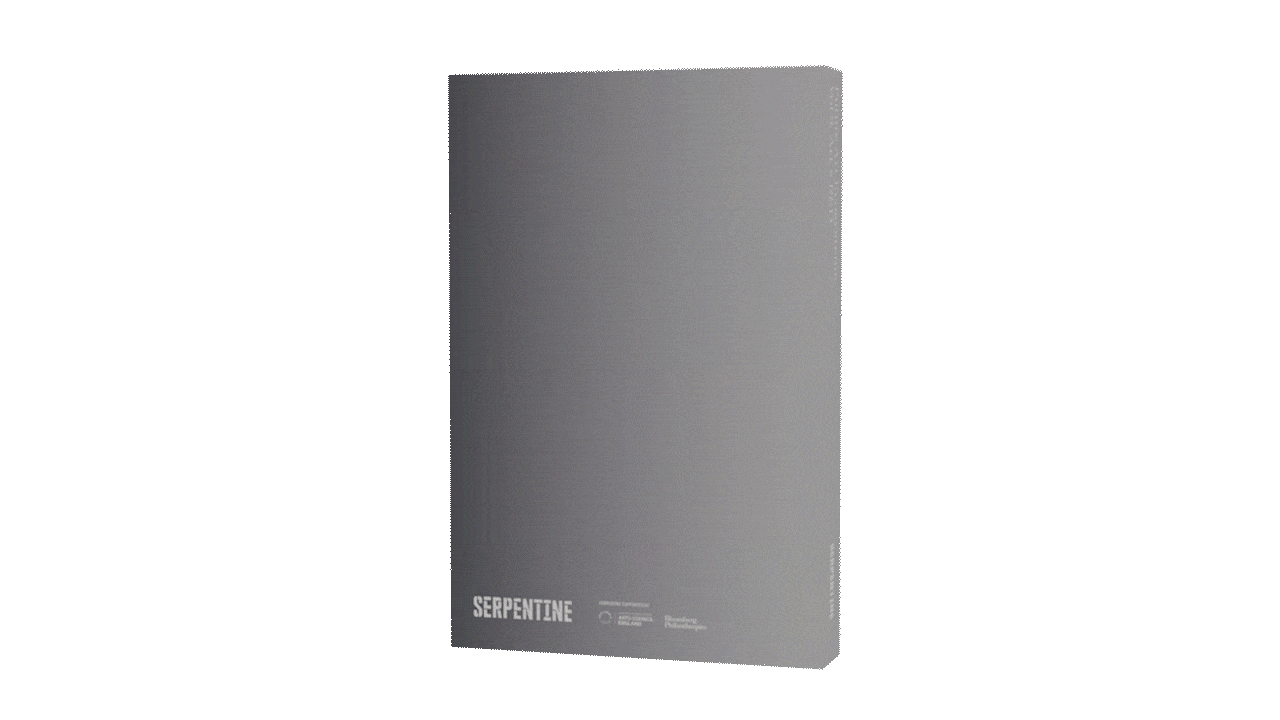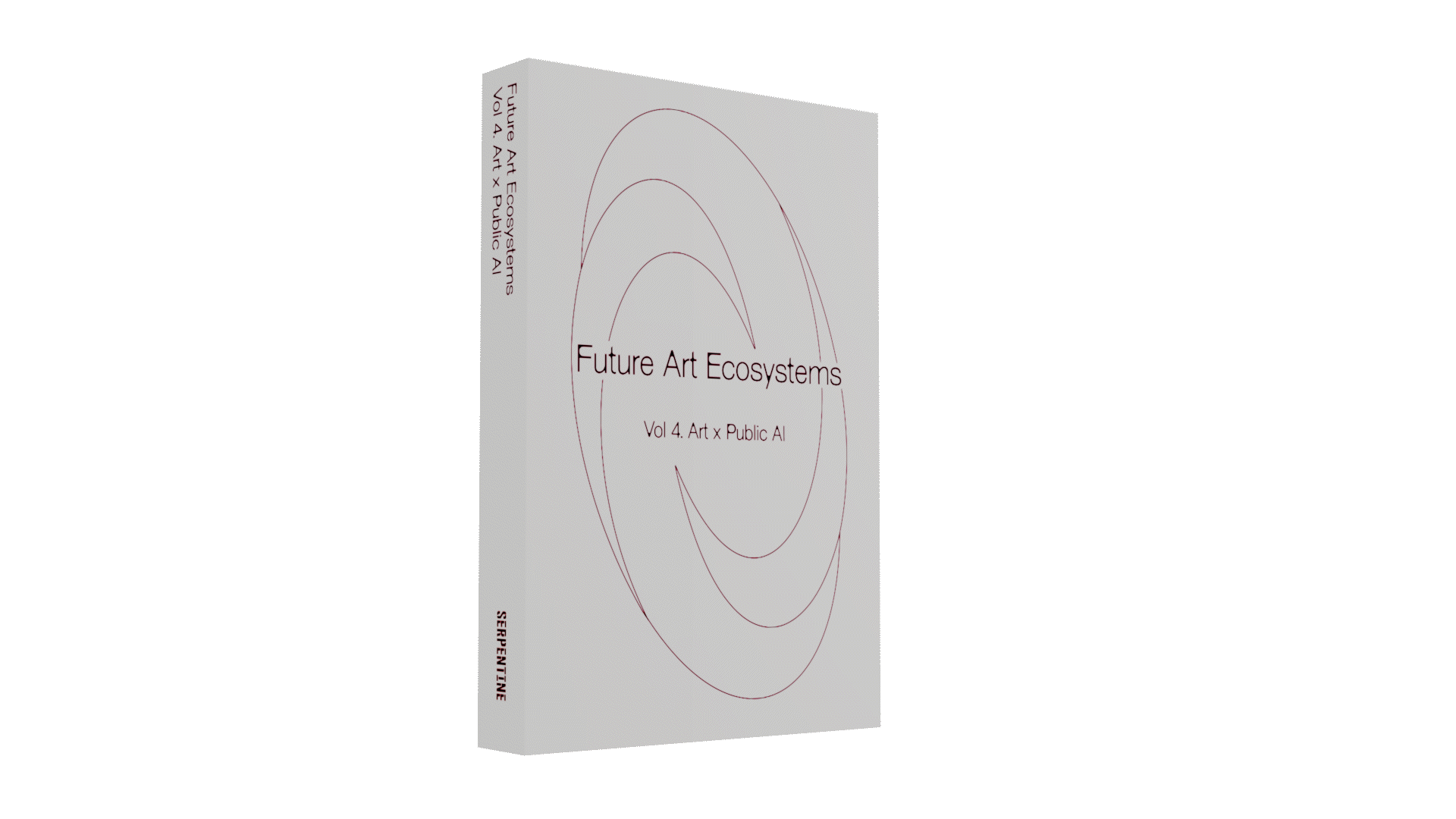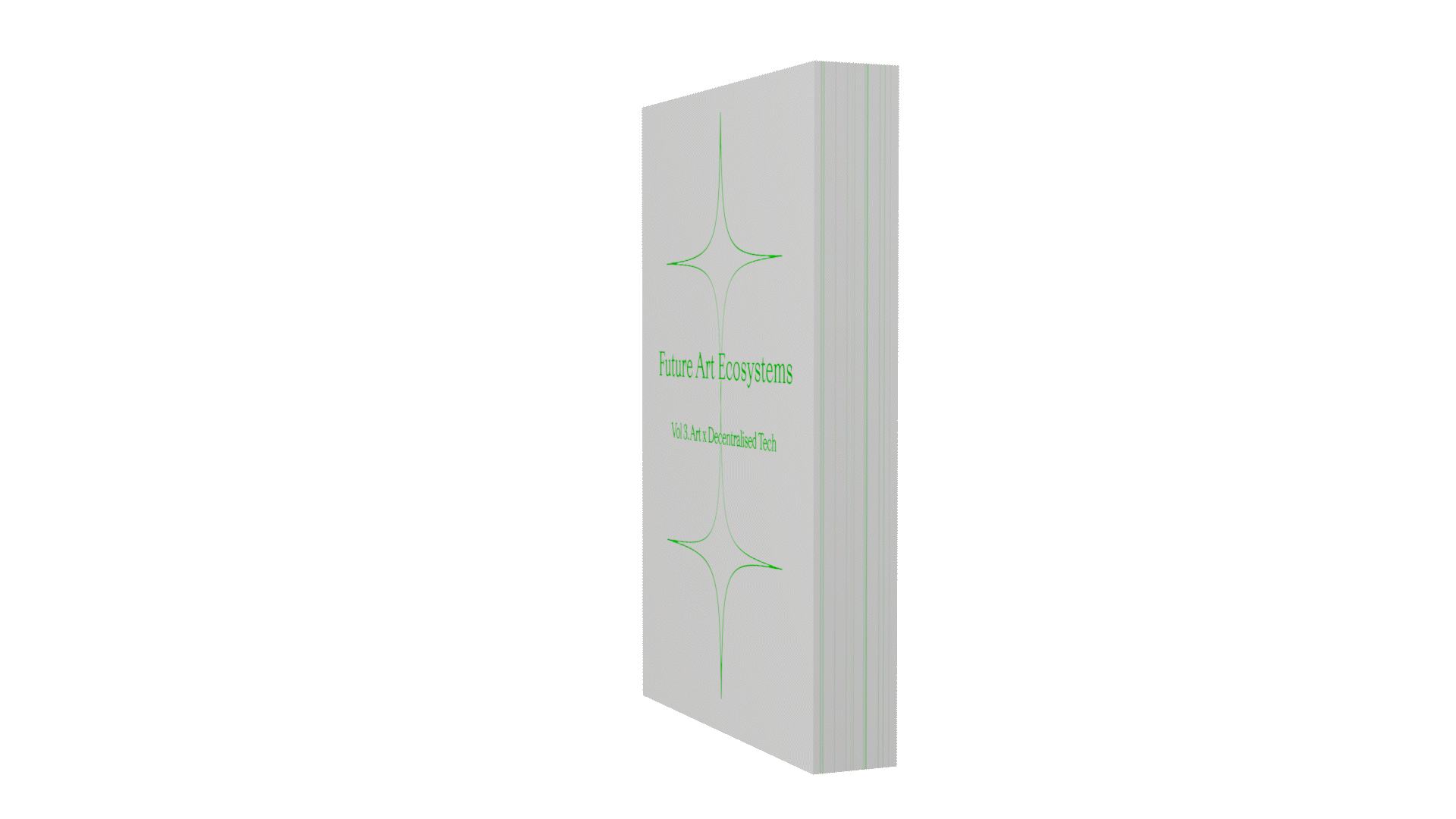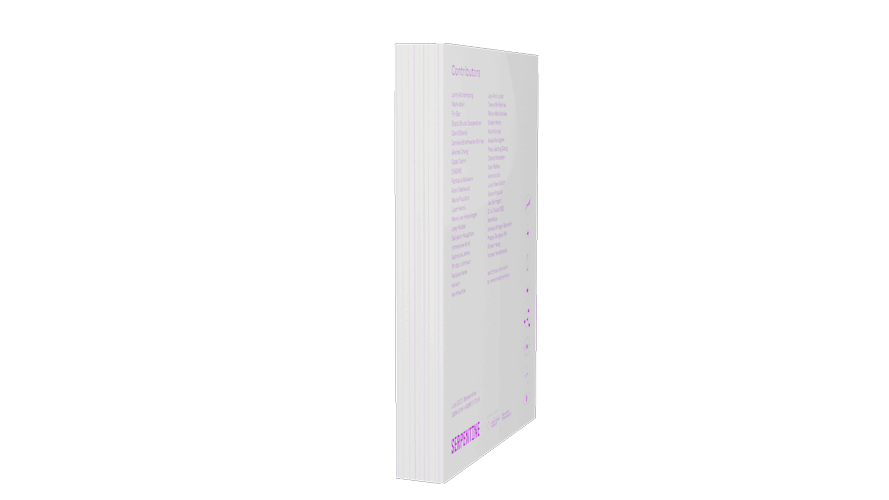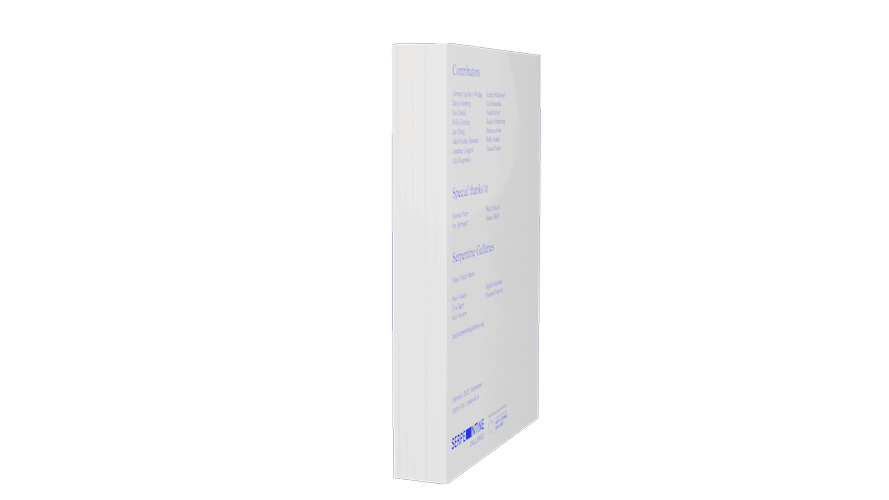Future Art Ecosystems is a project for building 21st century cultural infrastructure to support art and advanced technologies for the public good.
Through briefings, R&D Labs and a growing community of artists, technologists, policy-makers, researchers and fellow organisations, FAE develops insights, tools and projects that advance our mission. Embedded in Serpentine’s Arts Technologies team, FAE facilitates the emergence of new systems for art, technology and society.
Our research and partnerships span across four key areas where art x advanced technology (AxAT) practices can lead to meaningful infrastructural transformations in culture and beyond.

Advocating for independent, in-house and public-sector led production models as a key driver for AxAT practices.

Devising new benchmarks and systems for deeper and more long-term oriented collaborations between organisations across cultural, technological and civic ecosystems.

Prototyping new models to achieve generative and equitable value distribution that supports producers and their communities.

Moving beyond footfall and media visibility as the dominant metrics of success, and devising new measurement systems for communicating the value of AxAT in society.
Current: Tamar Clarke-Brown, Tommie Introna, Victoria Ivanova, Eva Jäger, Lina Martin-Chan, Vi Trinh, Ruth Waters and Kay Watson. It is initiated by and situated within the Arts Technologies department at Serpentine, London, UK.
Past: Ben Vickers, Sophie Netchaef, Alexander Boyes.
In 2014, Serpentine established the Arts Technologies department to lead on commissioning and production of artworks that engage with advanced technologies. What followed was an exciting series of collaborations with artists James Bridle, Ian Cheng, Jenna Sutela, Hito Steyerl and Jakob Kudsk Steensen leading to the development of new experimental artworks that deployed a variety of technologies from AI to VR and game engines. Each piece relied on the development of bespoke hybrid teams, technological systems and legal agreements – all of which offered unique insights into these technologies, and equally made evident the operational limitations of undertaking this type of cultural production in the context of a ‘legacy’ art institution.
It was the coupling of the opportunity to shine light on the R&D potential of artistic production processes, and the challenge of imagining new infrastructures to better support the evolving art and advanced technologies ecosystem, that led to the emergence of Future Art Ecosystems. In close collaboration with Rival Strategy, we (the Arts Technologies team) launched the annual FAE strategic briefings with our first publication, Future Art Ecosystems 1: Art x Advanced Technologies in 2020. Rooted in conversations with a diverse network of participants, the briefings have become widely shared resources that inform the practices and long-term strategies of artists, institutions and the wider cultural ecosystem, highlighting the role of FAE as an ecosystem-oriented project.
Today, FAE builds on the insights gained through the strategic briefings to develop partnerships and facilitate projects that are focused on what we consider to be the key priority areas for art x advanced technologies infrastructural development. Together with a wide range of collaborators – ranging from cultural institutions, artists, producers, curators, researchers and technologists to businesses, policy makers and mission-oriented organisations – we’re committed to researching, prototyping and building 21st century cultural infrastructure to support art and advanced technologies for the public good.
We collaborate with a wide range of actors who share our mission: cultural institutions, artists, producers, curators, researchers, technologists, businesses, policy makers and mission-oriented organisations across different sectors.
Alana Kushnir
Alasdair Milne
Alenda Chang
Alex Boyes
Alex Fleetwood
Alexandra Daisy Ginsberg
Alice Scope
Amelia Winger-Bearskin
Amira Gad
Andie Nordgren
Andrew Chitty
Anja Yencken
Anna Ridler
Annette Mees
Aslak Aamot Helm
Astrid Kohlmeier
Barry Threw
Ben Cerveny
Ben Vickers
Benedict Singleton
Beverley Hood
Billy Rennekamp
Black Shuck Cooperative
Bogna Konior
Brigitte Vézina
CROSSLUCID
Cade Diehm
Calum Bowden
Carmen Aguilar y Wedge
Caroline Sinders
Catherine Stihler
Cem Dagdelen
Charles Broskoski
Chella Ramanan
Chiara Di Leone
Christina Agapakis
Claire Tolan
Clare Reddington
Connal Parsley
Creative Commons
Daniel McClean
Danielle Brathwaite-Shirley
Dark Matter Labs
David Blandy
David Zilber
Delta_Ark
Doreen Rios
Dr Daniel Chávez Heras
Dr Jo Twist OBE
Dr Mercedes Bunz
Dr Noam Segal
Dr Oonagh Murphy
Dr Serena Iervolino
Dr Theresa Züger
Dr. Elizabeth Henaff
ENGINE
Ece Tankal
Eirini Malliaraki
Erin Kim
Etic Lab ISCRI Project
Eva Jäger
Evelyn Mora
Fantasia Malware
Fin Bar
Furtherfield
Gabriel Massan
Gabrielle Jenks
Gabrielle de la Puente
Gary Zhexi Zhang
Goethe Institut
Gray Area
Guest Work Agency
Harm van den Dorpel
Haus der Elektronischen Künste (HEK)
Heather Parry
Heather Schoell
Holly Herndon
Holly Jean Buck
Ian Cheng
Immersive Kind
Internet Archive
Ivaylo Getov
Jack Henderson
Jack Murray-Brown
Jakob Kudsk Steensen
James Wreford
Jay Springett
Jay-Ann Lopez
Jaya Klara Brekke
Jo Lansdowne
Joanna Zylinska
Joey Holder
Jon Uriarte
Jonathan Ledgard
Julia Kaganskiy
K Allado-McDowell
Kadine James and Lucy Wheeler
Kathleen E. Kim
Katrina Sluis
Kay Watson
Kei Kreutler
Keiken
Kelani Nichole
King’s College London
Klara Kofen
Larry Achiampong
Laura Herman
Laura Lotti
Lauren van Haaften-Schick
Laurence Mayer-Robitaille
Liam Hamill
Lina Martin-Chan
Liz Rosenthal
London South Bank University
Lucy Rose Sollitt
Luke Caspar Pearson
Madisen Taylor
Maggie Roberts/0rphan Drift
Maitreyi Maheshwari
Marie Foulston
Marie Potel-Saville
Mark Atkin
Mark Hurrell
Marta Ferreira De Sá
Martin Rauchbauer
María Paula Fernández
Mat Dryhurst
Matt Prewitt
Merel van Helsdingen
Michel van Dartel
Moisés Horta Valenzuela
NEW INC
NYU Digital Theory Lab
Natalie Kane
Nick Murray
Noah Raford
Opashona Ghosh
Paul Chaney
Penny Rafferty
Pete Jiadong Qiang
Peter Wu
Poppy Dongxue Wu
Primavera De Filippi
Rachel Armstrong
RadicalxChange
Rebecca Allen
Reema Selhi
Refik Anadol
Rhizome
Rindon Johnson
Rita Arrigo
Robert Yang
Robin McNicholas
Roddy Schrock
Roxanne Peters
Roxy Zeiher
Ruth Catlow
Ruth Waters
Róisín McVeigh
Sabine Himmelsbach
Saffron Huang
Safiya Ahmed
Sallyann Houghton
Salome Asega
Sam Rolfes
Samara Daioub
Sara Rayment
Sarah Friend
Seb Chan
Sebastian Berns
Simon Moreton
Somerset House Studios
Sophie Netchaef
Space Popular
Suhail Malik
Takashi Kudo
Tamar Clarke-Brown
Tega Brain
The White Pube
Tom Higham
Tommie Introna
Tony Lai
Trevor McFedries
University College London
Veronica So
Victoria Ivanova
Wade Wallerstein
Wendy Hanamura
Werkflow
William Kherbek
Yarden Yaroshevski
Yasaman Sheri
Yayoi Shionoiri
Zion König
You can explore our Twitch archive, or tune in live for special events. To get more involved, join our Telegram community, sign up to our monthly newsletter and take part in our quarterly Zoom call. For partnerships and other inquiries, please email us.
Your are about to leave futureartecosystems.org
Do you want to open a new tab?
Coming Soon!
